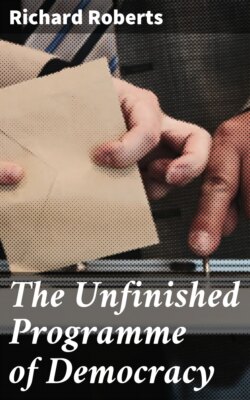Читать книгу The Unfinished Programme of Democracy - Richard Roberts - Страница 10
На сайте Литреса книга снята с продажи.
II
ОглавлениеTable of Contents
Yet it becomes plain, immediately we begin to discuss this question of ends, that if we exclude definitely religious considerations from the argument, we cannot indicate an end that has the character of a real end, that is, an absolute ultimacy. It is indeed questionable how far even the religious postulate directly provides the conception of an end, except to the comparatively small company of people who are strongly mystical by nature. The Shorter Catechism taught us that the chief end of man was to seek God and to glorify Him for ever, but to most of us this brings not information but bewilderment; and Mr. Kipling’s paradise where the painter “draws the thing as he sees it for the God of things as they are” is attractive but elusive. The truth appears to be that for the multitude of religiously disposed persons, the sense of God becomes effectual for conduct only as it dramatises itself in the form of a social vision or a personal relationship; and the ascendency of Jesus in the Christian tradition is explained by the power He has possessed of inviting that unreserved personal loyalty through which the sense of God assumes reality for common men. Such a phrase as “the glory of God” describes not our knowledge but our ignorance. All the content which can intelligibly be given to it is that there is an ideal end toward which we are called to move. This, however, does not mean that it is barren of immediate effect on conduct. We know that throughout history it has had the power to evoke a supreme disinterestedness in people who have been sensitive to it. It is, of course, akin to what Mr. Benjamin Kidd calls “the emotion of the ideal;” and it is related closely to the characteristic poetic anticipation and hope expressed in such passages as Tennyson’s in which he speaks of the “one far-off divine event to which the whole creation moves.”
But disinterestedness and “the emotion of the ideal,” while they are essential to any kind of healthy social existence afford but slender foundation for a positive social policy. No moral attitude or emotion will carry us far except it be evoked by an ideal which can dramatise itself in terms of a more or less achievable undertaking. We are therefore compelled to relinquish the hope of a definition of absolute social ends, and must be content with something more modest and manageable. We may at least attempt to indicate certain proximate social aims. Even if we cannot hopefully describe the ultimate goal of life, we may reasonably endeavour to answer the question—What do we want our social organisation to produce? Just what results are we to aim at? That some such discussion as this is involved in any fruitful handling of the question of social integration is clear from the fact that the conception of an aim is either implicit or explicit in all attempts to formulate a social polity ever since Aristotle defined the aim of the Republic as the promotion of the good life. But this definition, like Mill’s “greatest good of the greatest number” raises further questions—What is the nature of the good? What is the characteristic note and quality of the good life? This indeed takes us to the very centre of our problem; for at last the controversy between the militarist and the pacifist, the protectionist and the free-trader, the authoritarian and the libertarian, springs from differing conceptions of the good life. This is not to say that either party has worked out a reasoned conviction on the point. Both appear to start from certain instinctive acceptances, determined largely by temperamental variations—which points to the need of a rigorously rationalistic exploration of this entire region. Mr. Graham Wallace speaks of “the organisation of happiness”; but as he himself perceives, he is speaking in paradox. It seems in any case improbable that our social aims can be defined in terms of an emotional state.
